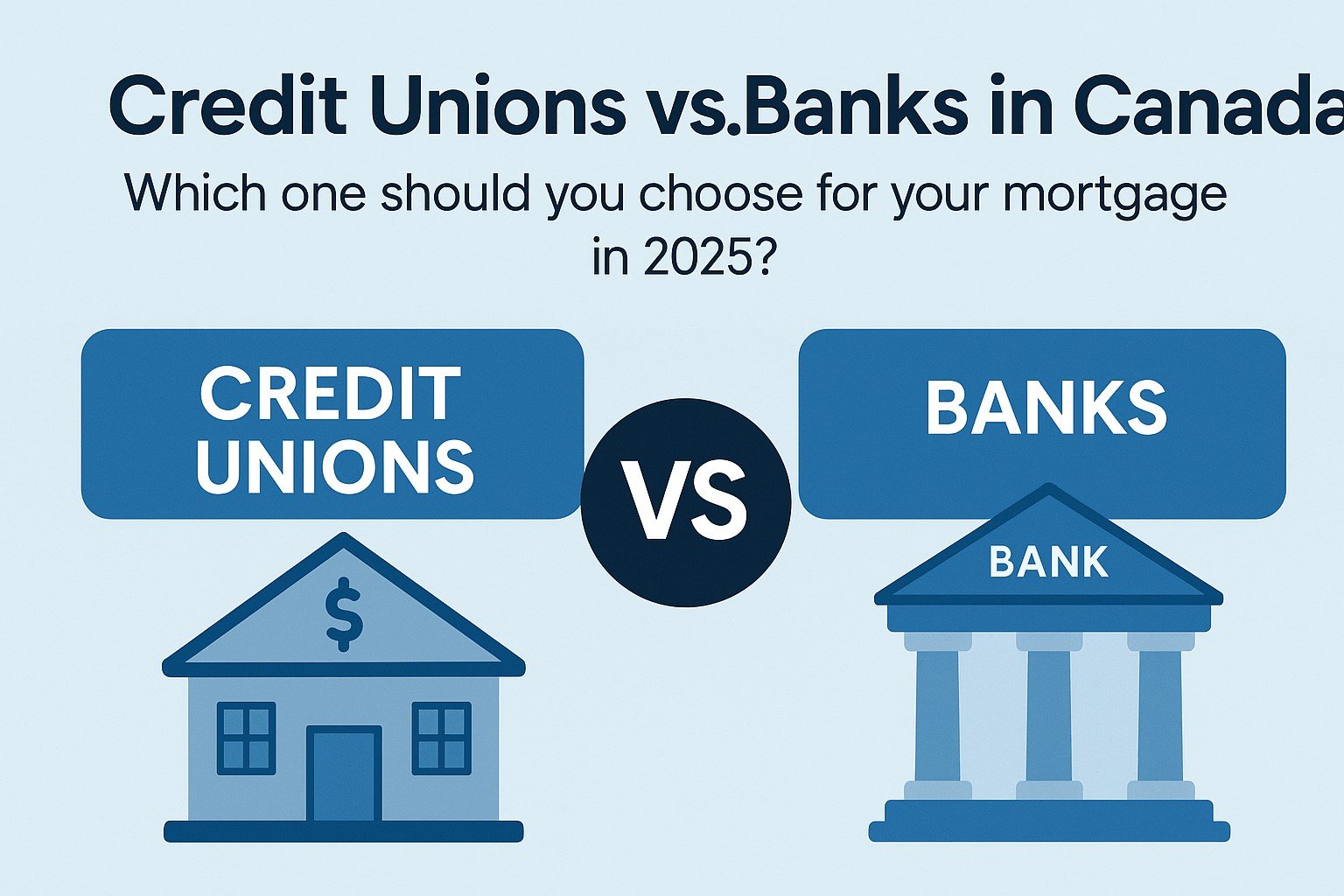
Credit Unions vs. Banks in Canada: Which One Should You Choose for Your Mortgage in 2025?
Trying to decide between a credit union or a bank for your mortgage in 2025? This guide breaks down the pros and cons of both to help you choose the better fit for your financial goals.
• What’s the Difference Between a Bank and a Credit Union?
• Are Credit Unions Safe in Canada?
• Real-Life Example: How Sandeep Got Approved Without the Stress Test
• Interest Rates: Who Offers Better Mortgage Deals?
• What About Mortgage Approval Flexibility?
• Member Benefits: Patronage Rebates and Personalized Service
• Are There Any Downsides to Credit Unions?
• Should You Choose a Bank or Credit Union in 2025?
• Final Thoughts from a Mortgage Expert
If you’re shopping for a mortgage in Canada, you’ve probably been told to compare rates, terms, and lenders. But one important choice often gets overlooked — should you go with a traditional bank or a credit union? They might seem similar, but the experience, flexibility, and even the savings can be very different. Let’s break it all down so you can make the best choice for your situation.
What’s the Difference Between a Bank and a Credit Union?
A **bank** is a for-profit financial institution. It’s often nationwide, regulated by the federal government, and publicly traded. **Credit unions**, on the other hand, are not-for-profit cooperatives. They’re owned by their members — the people who bank with them — and are regulated provincially.
That small difference changes a lot about how they operate. Credit unions usually reinvest earnings into better rates or lower fees. Banks prioritize shareholder profits.
Are Credit Unions Safe in Canada?
Yes, they are. Just like banks are protected by CDIC (Canada Deposit Insurance Corporation), credit unions have **provincial insurance**. For example, in Ontario, the **FSRA** insures eligible deposits at credit unions up to $250,000. Some provinces, like Manitoba and British Columbia, even offer unlimited deposit protection.
| Province | Bank Deposit Insurance (CDIC) | Credit Union Deposit Insurance |
|---|---|---|
| Federal (CDIC) | Up to $100,000 per category | Not covered federally |
| Ontario | CDIC coverage | Up to $250,000 (FSRA) |
| British Columbia | CDIC coverage | Unlimited (CUDIC) |
| Alberta | CDIC coverage | 100% unlimited (CUDGC) |
| Quebec | CDIC coverage | Unlimited (Autorité des marchés financiers) |
| Manitoba | CDIC coverage | Up to $250,000 (DGCM) |
| Saskatchewan | CDIC coverage | 100% unlimited (CUDGC) |
| Atlantic Provinces | CDIC coverage | Up to $250,000 (Varies by province) |
Real-Life Example: How Sandeep Got Approved Without the Stress Test
Sandeep, a freelance photographer in Vancouver, struggled to get a mortgage through a big bank. His income varied month to month, and he couldn’t pass the federal mortgage stress test.
A mortgage broker recommended a local credit union. Because they weren’t federally regulated, the credit union had more flexibility. They reviewed his last 2 years of self-employed income, looked at his savings, and approved his mortgage — no stress test required. Now he’s a homeowner and says the process felt much more personal than dealing with a big bank.
Interest Rates: Who Offers Better Mortgage Deals?
Credit unions often offer **competitive or even lower mortgage rates** than banks — especially for fixed terms. They might also provide longer rate holds or more flexible prepayment options. Banks, on the other hand, may have lower promotional rates but stricter conditions or penalties.
Ultimately, it varies by lender and by region — but don’t assume the big banks always have the lowest rate. Credit unions are worth checking.
What About Mortgage Approval Flexibility?
Here’s where credit unions often shine. Since they’re not federally regulated, some don’t require the mortgage stress test. They can also be more understanding of non-traditional income — like self-employed, seasonal, or gig economy earnings.
Banks, by contrast, tend to follow stricter federal guidelines and are less flexible about who qualifies.
Member Benefits: Patronage Rebates and Personalized Service
One unique feature of credit unions is the **patronage rebate**. At the end of the year, credit unions may return a portion of their profits to members, based on how much you borrowed or deposited.
You might also get access to financial advisors, member perks, and community-based services.
🏦 Patronage Rebate Breakdown – $300,000 Mortgage
| Component | Amount |
|---|---|
| Annual Interest Paid (at 5.5%) | $16,500 |
| Rebate Rate (e.g. 5%) | 5% |
| Rebate on Mortgage Interest | $825 |
| Additional Patronage (e.g. deposits, other services) | $175 |
| 💰 Total Rebate for the Year | $1,000 |
🔎 *Actual rebate amounts may vary based on your credit union’s policies and your full relationship (savings, loans, RRSPs, etc.).
Are There Any Downsides to Credit Unions?
Yes, a few. Some credit unions don’t have the same online tools or mobile apps that big banks do. Their mortgage products may be more limited or not portable if you move provinces. Also, some aren’t as quick with approvals as banks with automated systems.
So while you might get great service, it may not always come with the speed or digital ease of a big bank.
Should You Choose a Bank or Credit Union in 2025?
It depends on your situation. If you have straightforward income and want fast approval and digital banking, a bank might work well. If you’re self-employed, want personalized service, or don’t qualify under the usual stress test, a credit union might be the better choice.
Also, if supporting local and being a ‘member-owner’ appeals to you, credit unions offer that extra layer of community involvement.
Final Thoughts from a Mortgage Expert
Don’t overlook credit unions when comparing mortgage options. They might be smaller — but they can offer more flexible approval, competitive rates, and a personal touch. Always speak to a broker who works with both banks and credit unions, so you can see what fits you best. In 2025, your best mortgage may not come from the biggest name — but from the most understanding lender.
🏦 Still Unsure Which Option Is Right for You?
Whether you’re leaning toward a local credit union or a major Canadian bank, our licensed mortgage experts can help you compare rates, benefits, and terms to make the smartest decision.
📞 Talk to a Mortgage Expert NowStuck with a Mortgage Decision?
Don’t stress — our team is here to help. Reach out for free, no-obligation guidance.
Contact the Experts



